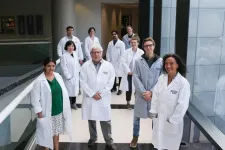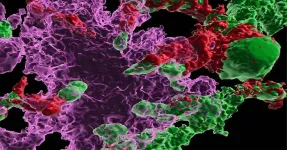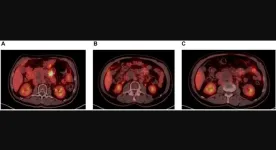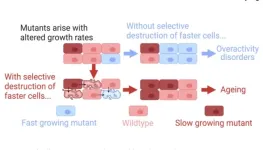(Press-News.org) TUCSON, Ariz., August 9, 2023 — Critical Path Institute (C-Path) announced today that Sanofi, a global leader in immunology and diabetes care, has joined its Type 1 Diabetes Consortium (T1DC). Sanofi joins T1DC as part of its commitment to push the boundaries of innovation to improve the lives of those with diabetes.
T1DC was established in 2017 with the goal to significantly advance the drug development landscape for T1D prevention and treatment. The consortium achieves this by fostering collaborative relationships within the broader T1D community and sharing data, knowledge and resources to promote the development and regulatory endorsement of novel drug development tools.
“Sanofi is committed to making a difference in the lives of those impacted by type 1 diabetes,” said Niels Porksen, Therapeutic Area Head DCV Development, Sanofi. “We are thrilled to join forces with the Critical Path Institute’s T1DC, as this collaboration underscores our dedication to advancing innovative solutions. We believe that by sharing knowledge, resources and data with this esteemed consortium, we can help accelerate the development of novel therapies and improve outcomes for patients living with T1D.”
We hope that Sanofi’s participation will help expedite advancements in both T1D prevention and treatment of new-onset T1D and look forward to working with Sanofi on accelerating progress towards developing breakthrough therapies and enhancing patient outcomes.
“T1D poses a considerable burden to patients and new and better therapies that improve the lives of those at risk or living with T1D are desperately needed,” said Elnaz Atabakhsh, Ph.D., Executive Director of C-Path’s T1DC. “The T1D Consortium works to accelerate the process to develop these therapies, a goal that can only be achieved through rich collaboration between scientists, clinicians, patients, regulators and key industry members including Sanofi. Sanofi’s experience and expertise will be invaluable to T1DC as we continue our efforts, and we are thrilled to have them join us as members of the T1D Consortium.”
Together, C-Path and Sanofi are committed to driving transformative change and achieving meaningful outcomes for patients.
About Critical Path Institute
Critical Path Institute (C-Path) is an independent, nonprofit established in 2005 as a public-private partnership, in response to the FDA’s Critical Path Initiative. C-Path’s mission is to lead collaborations that advance better treatments for people worldwide. Globally recognized as a pioneer in accelerating drug development, C-Path has established numerous international consortia, programs and initiatives that currently include more than 1,600 scientists and representatives from government and regulatory agencies, academia, patient organizations, disease foundations and pharmaceutical and biotech companies. With dedicated team members located throughout the world, C-Path’s global headquarters is located in Tucson, Arizona and C-Path’s Europe subsidiary is headquartered in Amsterdam, Netherlands. For more information, visit c-path.org.
Critical Path Institute is supported by the Food and Drug Administration (FDA) of the Department of Health and Human Services (HHS) and is 55% funded by the FDA/HHS, totaling $17,612,250, and 45% funded by non-government source(s), totaling $14,203,111. The contents are those of the author(s) and do not necessarily represent the official views of, nor an endorsement by, FDA/HHS or the U.S. Government.
END
C-Path welcomes Sanofi to its Type 1 Diabetes Consortium to help advance drug development
The global immunology and diabetes leader will collaborate with C-Path’s T1DC to drive transformative change in type 1 diabetes prevention and treatment.
2023-08-10
ELSE PRESS RELEASES FROM THIS DATE:
How sure is sure? Incorporating human error into machine learning
2023-08-10
Researchers are developing a way to incorporate one of the most human of characteristics – uncertainty – into machine learning systems.
Human error and uncertainty are concepts that many artificial intelligence systems fail to grasp, particularly in systems where a human provides feedback to a machine learning model. Many of these systems are programmed to assume that humans are always certain and correct, but real-world decision-making includes occasional mistakes and uncertainty.
Researchers from the University of Cambridge, along with The Alan Turing Institute, Princeton, and Google DeepMind, have been attempting ...
Large study suggests people with low levels of vitamin K have less healthy lungs
2023-08-10
People with low levels of vitamin K in their blood are more likely to have poor lung function and to say they suffer with asthma, chronic obstructive pulmonary disease (COPD) and wheezing, according to a study published today (Thursday) in ERJ Open Research [1].
Vitamin K is found in leafy green vegetables, vegetable oils and cereal grains. It plays a role in blood clotting, and so helps the body to heal wounds, but researchers know very little about its role in lung health.
Researchers say their new findings do not alter the current advice on vitamin K intake, but they do support further research to ...
Sanford Burnham Prebys Cancer Center earns merit extension from NCI
2023-08-10
Sanford Burnham Prebys’ Cancer Center has received a rare and prestigious Merit Extension Award from the National Cancer Institute (NCI), recognizing and rewarding its earlier accomplishments as well as current research plans. The award extends the center’s current 5-year Cancer Center Support Grant (CCSG) for an additional two years.
There are only seven Basic Laboratory Cancer Centers in the NCI’s national network. These centers focus primarily on laboratory research: developing, conducting, translating and advancing fundamental discoveries to clinical testing and, ultimately, ...
Stem cell therapy rescues symptoms of Alzheimer’s disease
2023-08-09
In the ongoing search for a cure for Alzheimer’s disease, a burgeoning branch of medicine is bringing new hope. Stem cell therapies are already being used to treat various cancers and disorders of the blood and immune system. In a new proof-of-concept study, scientists at University of California San Diego show stem cell transplants may also be a promising therapeutic against Alzheimer’s.
In the study, publishing this month in Cell Reports, the researchers demonstrate that transplanting hematopoietic ...
Penn Medicine neuroscientists identify brain mechanism that drives focus despite distractions
2023-08-09
PHILADELPHIA—Trying to finish your homework while the big game is on TV? “Visual-movement” neurons in the front of your brain can help you stay focused, according to a new study from neuroscientists in the Perelman School of Medicine at the University of Pennsylvania.
In the study, published recently in Neuron, the scientists sought to illuminate the neural mechanism that helps the brain decide whether to focus visual attention on a rewarding task or an alluring distraction. By analyzing neuron activity in animal models as they faced this kind of attentional ...
Novel machine-learning method produces detailed population trend maps for 550 bird species
2023-08-09
Scientists at the Cornell Lab of Ornithology have developed a novel way to model whether the populations of more than 500 bird species are increasing or decreasing. The method solves a nagging statistical problem by accounting for year-to-year changes in the behavior of people collecting the data. The result is detailed trend maps for each species down to an eight-mile radius--a major boost for local conservation efforts. Scientists used an approach called Double Machine Learning. Details are published in the journal Methods in Ecology and Evolution.
“Changing human behavior presents a problem for statistical analysis ...
CDK9 Inhibitors: A promising combination partner in treating hematological malignancies
2023-08-09
“[...] CDK9 inhibitors could play a role in future treatments of hematological diseases and could be a great ally when combined with other therapeutic approaches.”
BUFFALO, NY- August 9, 2023 – A new research perspective was published in Oncotarget's Volume 14 on August 7, 2023, entitled, “CDK9 INHIBITORS: a promising combination partner in the treatment of hematological malignancies.”
In their new perspective, researchers Daniel Morillo, Gala Vega and Victor Moreno from Hospital Fundación Jiménez Díaz discuss Cyclin-dependent ...
A novel theory of aging — independent of damage accumulation
2023-08-09
“We argue that in multicellular organisms, neighbouring cells are in constant competition.”
BUFFALO, NY- August 9, 2023 – A new editorial paper was published in Aging (listed by MEDLINE/PubMed as "Aging (Albany NY)" and "Aging-US" by Web of Science) Volume 15, Issue 14, entitled, “A novel theory of ageing independent of damage accumulation.”
The underlying cause or causes of aging are an enduring mystery, but in 1977 Kirkwood postulated that organisms might gain a fitness advantage by reducing investment in somatic maintenance if this allowed them to invest more resources in more crucial ...
Long-term use of certain acid reflux drugs linked to higher risk of dementia
2023-08-09
MINNEAPOLIS – People who take acid reflux medications called proton pump inhibitors for four-and-a-half years or more may have a higher risk of dementia compared to people who do not take these medications, according to new research published in the August 9, 2023, online issue of Neurology®, the medical journal of the American Academy of Neurology. This study does not prove that acid reflux drugs cause dementia; it only shows an association.
Acid reflux is when stomach acid flows into the esophagus, usually after a meal or when lying down. People with acid reflux may experience heartburn and ulcers. People ...
Research sheds new light on gene therapy for blood disorders
2023-08-09
Research from experts at Michigan Medicine, the Children’s Hospital of Philadelphia and Penn Medicine is breaking ground on new ways of treating blood disorders, such as sickle cell anemia, through gene therapy.
To cure blood disorders, patients must undergo high dose chemotherapy and bone marrow transplantation. This requires a match between the recipient and donor immune system, but ~30% of patients do not have a match. Even when they do the donor immune system can attack the patient, graft versus host disease.
Gene therapy corrects the mutation in a patient’s own cells ...
LAST 30 PRESS RELEASES:
Yale study challenges notion that aging means decline, finds many older adults improve over time
Korean researchers enable early detection of brain disorders with a single drop of saliva!
Swipe right, but safer
Duke-NUS scientists identify more effective way to detect poultry viruses in live markets
Low-intensity treadmill exercise preconditioning mitigates post-stroke injury in mouse models
How moss helped solve a grave-robbing mystery
How much sleep do teens get? Six-seven hours.
Patients regain weight rapidly after stopping weight loss drugs – but still keep off a quarter of weight lost
GLP-1 diabetes drugs linked to reduced risk of addiction and substance-related death
Councils face industry legal threats for campaigns warning against wood burning stoves
GLP-1 medications get at the heart of addiction: study
Global trauma study highlights shared learning as interest in whole blood resurges
Almost a third of Gen Z men agree a wife should obey her husband
Trapping light on thermal photodetectors shatters speed records
New review highlights the future of tubular solid oxide fuel cells for clean energy systems
Pig farm ammonia pollution may indirectly accelerate climate warming, new study finds
Modified biochar helps compost retain nitrogen and build richer soil organic matter
First gene regulation clinical trials for epilepsy show promising results
Life-changing drug identified for children with rare epilepsy
Husker researchers collaborate to explore fear of spiders
Mayo Clinic researchers discover hidden brain map that may improve epilepsy care
NYCST announces Round 2 Awards for space technology projects
How the Dobbs decision and abortion restrictions changed where medical students apply to residency programs
Microwave frying can help lower oil content for healthier French fries
In MS, wearable sensors may help identify people at risk of worsening disability
Study: Football associated with nearly one in five brain injuries in youth sports
Machine-learning immune-system analysis study may hold clues to personalized medicine
A promising potential therapeutic strategy for Rett syndrome
How time changes impact public sentiment in the U.S.
Analysis of charred food in pot reveals that prehistoric Europeans had surprisingly complex cuisines
[Press-News.org] C-Path welcomes Sanofi to its Type 1 Diabetes Consortium to help advance drug developmentThe global immunology and diabetes leader will collaborate with C-Path’s T1DC to drive transformative change in type 1 diabetes prevention and treatment.





